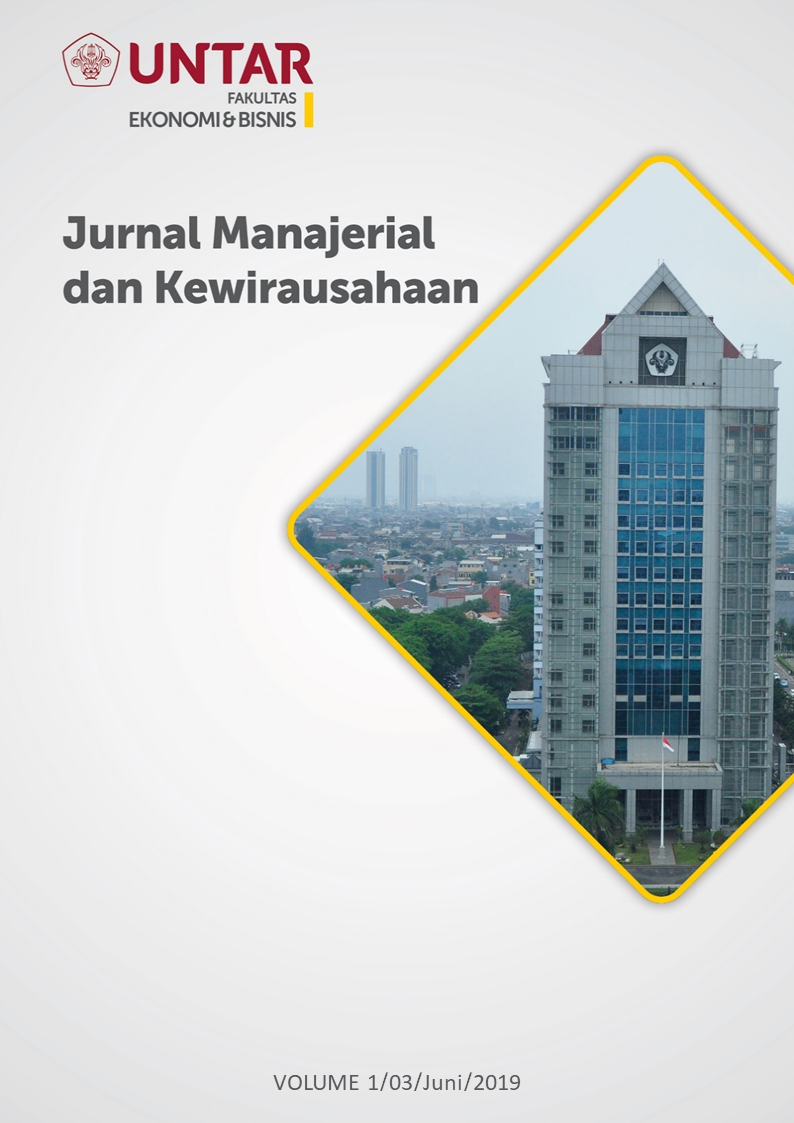Pengaruh Dukungan Pendidikan, Dukungan Relasi, Dan Kepercayaan Diri Terhadap Intensi Berwirausaha Mahasiswa
Main Article Content
Abstract
The purpose of this research is to examine whether: 1) educational support can affect entrepreneurial intention, 2) relational support can affect entrepreneurial intention, 3) self-confidence can affect entrepreneurial intention. Sample was selected using nonprobability sampling method amounted to 100 respondents of university students in Indonesia. Data were measured by Likert scale and analyzed with processing techniques using SmartPLS 3.0 program. The result of this study shows that 1) educational support positively had affect on entrepreneurial intention, 2) relational support positively had affect on entrepreneurial intention and, 3) self-confidence positively had affect on entrepreneurial intention. Several recommendations for research are presented based on conclusions and suggestions on the results of this study
Tujuan dari penelitian ini adalah untuk menguji apakah: 1) dukungan pendidikan dapat mempengaruhi intensi berwirausaha, 2) dukungan relasi dapat mempengaruhi intensi berwirausaha, 3) kepercayaan diri dapat mempengaruhi intensi berwirausaha. Sampel dipilih menggunakan teknik nonprobability sampling dengan jumlah 100 responden mahasiswa di Indonesia. Data diukur dengan skala Likert dan dianalisis dengan teknik proses yang menggunakan program SmartPLS 3.0. Secara keseluruhan, hasil penelitian ini menunjukkan bahwa 1) dukungan pendidikan berpengaruh positif terhadap intensi berwirausaha, 2) dukungan relasi berpengaruh positif terhadap intensi berwirausaha, dan 3) kepercayaan diri berpengaruh positif terhadap intensi berwirausaha. Beberapa rekomendasi untuk penelitian disajikan berdasarkan kesimpulan dan saran mengenai hasil penelitian ini.
Article Details
This work is licensed under a Jurnal Muara Ilmu Ekonomi dan Bisnis Creative Commons Attribution-ShareAlike 4.0 International License.,/p>
References
Ajzen, I. (1991). The theory of planned behavior. Organizational Behavior and Human
Decision Process, 50, 179–211.
Ambad, S.N.A., and Damit, D.H.D.A. (2016). Determinants of Entrepreneurial Intention
Among Undergraduate Students in Malaysia. Procedia Economics and Finance.
Baron, R. A., dan Byrne, D. (2003). Psikologi sosial. Jakarta: Erlangga.
Burns, A. C., and Bush, R. F. (2014). Marketing Research (7th ed.). England: Pearson
Education Limited.
Cohen, Jacob. (1988). Statiscal Power Analysist for the Behavioral Sciences (Ed. 2). Hillsdale:
Erlbaum Associates.
Garaika, and Margahana, H. (2019). Self Efficacy, Self Personality and Self Confidence on
Entrepreneurial Intention: Study on Young Enterprises. Journal of Entrepreneurship
Education, 2(1).
Gelaidan, H.M., Abdullateef, A.O. (2017). Entrepreneurial intentions of business students in
Malaysia: The role of self-confidence, educational and relation support. Journal of
Small Business and Enterprise Development, 24(1), 54-67.
Hair, J. F., Ringle, C. M., and Sarstedt, M. (2011). PLS-SEM: Indeed a Silver Bullet. The
Journal of Marketing Theory and Practice, 19(2), 139-151.
Henderson, R., and Robertson, M. (2000). Who wants to be an entrepreneur? Young adult
attitudes to entrepreneurship as a career”. Career Development International, 5(6),
-287.
Henseler, J., Ringle, C. M., and Sinkovics, R. R. (2009). The use of partial least square path
modeling in International Marketing. Advances in International Marketing, 20, 277-
Ismail, M., Khalid, S. A., Othman, M., Jusoff, H. K., Rahman, N. A., Kassim, K. M., and Zain,
R. S. (2009). Entrepreneurial intention among Malaysian undergraduates.
International Journal of Business and Management, 4(10), 54-60.
Izquierdo, E., and Buelens, M. (2008). Competing models of entrepreneurial intentions: the
influence of entrepreneurial self efficacy and attitudes. In Presentado en
Internationalizing Entrepreneurship Education and Training IntEnt 2008 Conference,
e20, Oxford Ohio, USA.
Kusmintarti, A., Asdani, A., and Riwajanti, N.I. (2017). The relationship between creativity,
entrepreneurial attitude and entrepreneurial intention (case study on the students of
State Polytechnic Malang). Int. J. Trade and Global Markets, 10(1), 28–36.
Liñán, F. (2004). Intention-based models of entrepreneurship education. Piccola
Empresa/Small Business, 3, 11-35.
Luthje, C. and Franke, N. (2003). The making of an entrepreneur: testing a model of
entrepreneurial intent among engineering students at MIT. R&D Management, 33(2),
-47.
Sekaran, U., and Bougie, R. (2013). Research Methods for Business (6th ed.). Italy: Printer
Trento Srl.
Sesen, H. (2013). Personality or environment? A comprehensive study on the entrepreneurial
intentions of university students. Education + Training, 55(7), 624–640.
Turker, D., Onvural, B., Kursunluoglu, E., and Pinar, C. (2005). Entrepreneurial propensity: a
field study on the Turkish university students. International Journal of Business,
Economics and Management, 1(3), 15-27.
Twibell, R. S., Siela, D., Riwitis, C., Wheatley, J., Riegle, T., Bousman, D., Cable, S., Caudill,
P., Harrigan, S., and Hollars, R. (2008). Nurses’ perceptions of their self-confidence
and the benefits and risks of family presence during resuscitation. American Journal
of Critical Care, 17(2), 101–111.
Wetzels, M., Odekerken-Schroder, G., and Van Oppen, C. (2009). Using PLS path modeling
for assessing hierarchical construct models: Guidelines and empirical illustration. MIS
Quarterly, 33(1), 177-195.
Yurtkoru, S. Ku?cu, Z.K., and Do?anay, A. (2014). Exploring the Antecedents of
Entrepreneurial Intention on Turkish University Students. Procedia- Social and
Behavioral Sciences, 150, 841-850
Zimmerer, W.T. (2002). Essentials of Entrepreneurship and Small Business Management (3rd
ed.). New York: Prentice-Hall.



